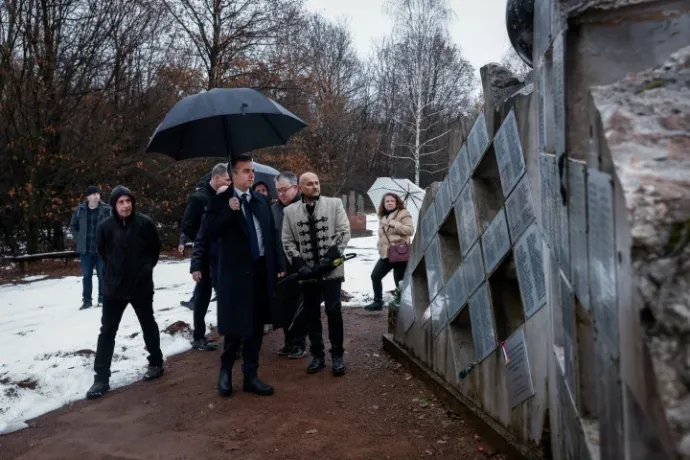Pressman: sometimes it is worrying how hostile the Hungarian government's attitude towards the US government is

"The main message of this place is that freedom is not self-evident. And we need to know about it, so that these things would never happen again." This was David Pressman's takeaway from his visit at the Recsk labour camp. There's usually a message behind the location of a diplomat's visit, but we weren't able to find out why the US ambassador visited the place that's been referred to as the Hungarian Gulag this week, around the same time the Hungarian Parliament adopted the Sovereignty Protection Bill.
"Do you see any signs of threats to democracy in Hungary?" – we asked him, but the diplomat replied diplomatically: "Democracy is not a static condition, but a process that all countries, including Hungary, must manage and protect." Let us conclude, then, that the reason for visiting the labour camp, where 1,500 political prisoners were held over a period of three years, was that it had closed exactly 70 years ago and that the memorial park at the site of the camp that was once kept a secret and later demolished, opened exactly 27 years ago.
Since Pressman's appointment in Hungary and his low-key reception by the government, he has been "travelling the country, talking to people": he has been to Mátészalka, met refugees from Ukraine, visited Pécs, Veszprém, Szeged and Miskolc. This time he met elderly locals and pupils of the local primary school in Recsk.
One of the pupils also told him the most important thing to know about America is that they speak English and people put their hands together to beg for bread. "Yes, it's like that, and unfortunately, there are many such places in the world, including in Hungary" – was the parallel drawn by the ambassador, who had after all come to talk about common issues between the two countries.

And talk he did, a few rooms away, with a few dozen, mostly elderly people, after the mayor – Sándor Nagy, who won in 2014 as a candidate of the extreme right-wing Jobbik and in 2019 as an independent candidate – greeted him by saying that "it is not every day that a prominent person like him comes here".
Some sympathised with Pressman
Pressman encouraged the audience to ask questions, to talk about what they felt was important for the country, their village or the relationship between the two countries. "We're seeing that the statements being made about you from the government's side are not the most positive. How does that affect you?" – this question apparently touched a nerve with Pressman:
"One of the reasons why I travel outside Budapest a lot is so that Hungarians can hear directly from me what the United States thinks is important and what it is doing. What you read in the newspapers, see on TV, and hear on the radio is mostly a product of the government's messaging. Sometimes it is about me personally, sometimes it is about US policy.
It is sometimes worrying how hostile the attitude of the Hungarian government is towards the US government."
According to Pressman, this over-politicised, hostile attitude has something to do with the way the world has changed since February 24, 2022, when Russia launched a war against Ukraine.
From then on, "the stakes for relations within NATO, of which both Hungary and the United States are proud members, have become much higher, and the stakes for the unity of the European Union have also increased. When we and our European allies see that Hungary is taking a different approach from the others to common national security interests that are also fundamental for the United States, whether regarding Ukraine, Vladimir Putin, Russia, it is a cause for concern. This is something the United States cannot ignore."
These were the issues raised by the audience as well: the war in Ukraine and energy supplies. "Nobody wants to be dependent on the Russians," Pressman said. "Can you answer the question, who we should depend on instead?" – interjected a questioner.
Pressman said, however, that it is not a question of replacing one dependency with another, "the United States does not care" where Hungary gets its energy from, the point is diversification. Hungary relies 100 percent on Russian sources in the nuclear field, 80 percent for natural gas and 70 percent for crude oil, but it would be important for Hungary to have alternative sources.

The Hungarian government argues that this is not about politics, it is simply about physical opportunities. Pressman admits that there should be no room for politics in this, but he finds it thought-provoking that all the countries in the region have taken substantial steps to move away from Russian resources, while Hungary would instead increase dependence.
More than a debate between Orbán and the Democrats
"I ask our partners in the government these same questions, but the answer is usually a rhetorical message, often directed against me, often directed against the United States."
According to the US ambassador, these are not partisan political issues, but concern a common security policy, such as Sweden's membership of NATO, which Hungary, an EU member of the alliance, still has not ratified. Or the need to step up pressure on Russia, which has attacked its democratic neighbour, the ambassador said, noting that there is no difference between Republicans and Democrats on this issue. He implicitly suggested that the perception of Hungary's outlier policy would not change even if a Republican candidate, including Donald Trump, won next year's presidential election instead of the Democrat Biden. He suggested that Hungary's relationship with Ukraine is also affected, although military and financial support for Ukraine is less advocated by Republicans than by Democrats in the US.
"I suggest you read the news as I do: as messages from the Hungarian government, which are sometimes worrying."
– said the ambassador, providing a clue to the workings of the pro-government press. Pressman is often accused by the government of meddling in Hungary's internal affairs.
But he says it is not about interfering in domestic affairs – the recent mudslide at the Recsk mine, for example, did not even come up – but it's about discussing common interests. After all, this is a precondition for "maintaining the security alliance of which Hungary has been a member for 25 years. This is important for Hungary's national security, sovereignty and border protection, and it is also important for the United States", the Ambassador added. According to him, the common alliance is "being put to the test by the Russian President's attack on Ukraine", and the members of the alliance must react together, regardless of their political worldview. To do this, "it is important to understand and see what it means when Viktor Orbán meets with Vladimir Putin in China," Pressman said.
Everyone here is pro-peace, the only difference is how it should be achieved
On the war in Ukraine, he was trying to persuade the audience that the United States, like Hungary, wants peace in Ukraine. However, this is not happening because Russia, the aggressor is not willing to make a deal and is not responding to Ukrainian President Volodymyr Zelensky's 12-point proposal.
The questions suggested that the audience felt that this was being blocked more by the West and Kyiv, and that negotiations should be started. It is another matter that the Hungarian government, which claims to be pro-peace, has never specified the conditions under which it sees a realistic basis for a genuine peace negotiation, since Russia, for its part, has not come up with such a proposal, and it even contests Ukraine's right to exist. Russian propagandists would even split Ukraine up between Hungary, Poland and Ukraine.
"If Ukraine stops fighting, the country will cease to exist. If Russia stops fighting, the war will end," the ambassador said, making an important distinction.
Whether he managed to convince the audience of this remains a question, although the mayor said, "we tried to welcome him in a way befitting his office, so that when he leaves here he can say that yes, this village welcomed us as friends, not enemies. We know very well how the media portrays him, and we have tried to put that aside." Based on the impressions of one participant, they suceeded: "He was very likable, one could see he is a decent person."
And if one thinks about it, for an American diplomat in Hungary in 2023, getting to this point from Viktor Orbán's nickname for him: Présember (in Hungarian: the man who presses) is no small achievement, especially within a few hundred metres from what used to be the Hungarian Gulag.
For more quick, accurate and impartial news from and about Hungary, subscribe to the Telex English newsletter!